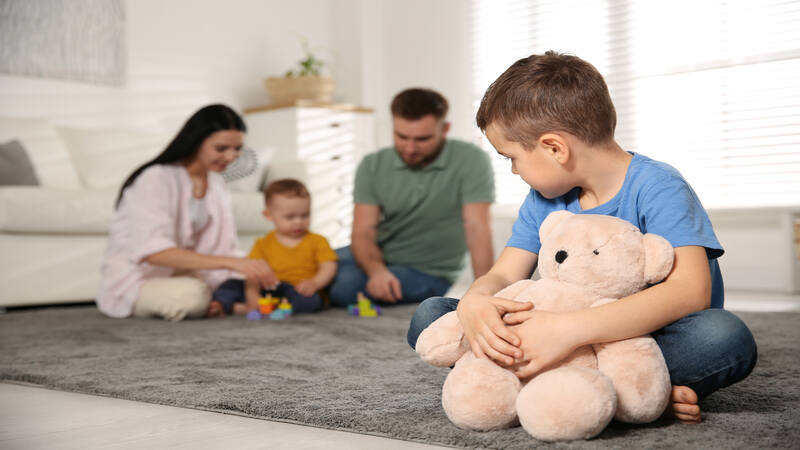
You had heard plenty of stories where older kids start behaving in a difficult manner when a younger sibling is born. So you prepared yourself well in advance to ensure your older child continues to feel as much loved and attended to as before. You spent hours preparing him for the new baby. You made him touch your tummy, you made him talk to the baby inside, and you did everything the book says. And he seemed ready. But the day the baby was born, you noticed your older child changing. He was not as excited as before. He did not even look happy. And his behavior became very different.
Sibling Rivalry – The Truth
Sibling rivalry starts or exists even before the birth of the younger baby. Having a new baby in the family can be tougher for a child, who is used to get all the attention. Now, you probably understand that, and thus want to ensure that your child adjusts to the new baby. You told everyone around to focus on the older child as the younger one was a baby anyway. However, this proved to be a herculean task. Everyone was more excited about the baby. Everyone got the baby gifts (some did get gifts for the older one as well, but the younger one’s boxes were bigger!). Everyone exclaimed how cute and small and adorable the small one is, while the older one withdrew himself to the corner.
And not soon after, your older one started acting out. He started explicitly showing his feelings of sibling rivalry. His behavior regressed, meaning, he started behaving like a baby all over again (bed wetting, bottle feeding, needing help for things that he otherwise did independently etc.). He became aggressive at times and often displayed defiant behavioral traits. He became withdrawn at other times.
There is no need to feel helpless. There are ways you can bring your older child back to normal. But before that, you need to empathize with your older one.
Understanding Why The Older Child Is Acting Out
Before you feel disappointed that all your preparatory talks with your older child has gone down the drain, try to empathize what he/she might be going through. Let us help you to do that. You know your husband (or wife, if you are a dad) adores and loves you, right? Now how would you feel if he tells you “I love you so much, let me get one more wife.” And the new wife he gets is younger and cuter. You try to like her for your husband’s sake, but it is really difficult. Especially because everyone seems to be showering her with gifts. When you are out with your husband and the new wife, everyone exclaims how cute and adorable she is. And worse, your husband expects to share your stuff with her! Did we get your blood boiling? Now think for a second what your older child is going through.
Your older child will be feeling extremely difficult to cope up with the notion of sharing you, especially if he/she was closer to you (mommy) than your spouse. The age of the older child plays a factor too. Toddlers find it tougher to accept a sibling than older and more mature school going kids.

How To Help The Older Child Adjust To The New Baby?
- Have one-on-ones: Both you and your spouse need to spend some one-on-one time with your older kid. It could be 10 minutes or one hour. But set aside some time, individually, every day. Do not talk about the baby during this time. Focus completely on the older child
- Have him help you: The more your child feels involved in caring for the baby, better he will feel about the situation. Do not force, but give your older kid age-appropriate tasks related to baby
- Warn visitors: This will take some effort, but ensure the visitors first talk to the older kid. Your baby is too small to know the difference anyway. You can tell them this as soon as they come or smartly include the older kids into conversations. Ask the older one to sit with you, hold his hand, ruffle the hair, and ta-da!
- Gift: Buy a “big brother” or “big sister” gift. Kids love gifts and getting one that is associated with their new title is bound to make them proud of the role
- Listen: Your child might or might not show explicit signs of sorrow. Watch his behavior closely. Listen to everything he is saying, even when he is playing alone. Try to read the nonverbal communication. Your child might even be feeling guilty of the negative thoughts. Help them put their feelings into words. Tell them this is normal
- Show him how to vent: If your child is feeling extremely angry or aggressive, he might feel like hurting the new baby on the block who seems to be ruining everything for him. Tell him, categorically, that no hurting is allowed. Instead, teach your child other safer ways to vent out his anger
- Pamper the older child: If your child is showing regression, then pamper them a bit. He wants to take bottle once or twice. Let him. He probably will find it weird and stop himself after 1-2 times. But if you refuse, he will become more aggressive. He wants you to “baby” him. Do it. Do whatever it takes to make him understand that he is no less of a priority to you and your spouse
Good luck!

